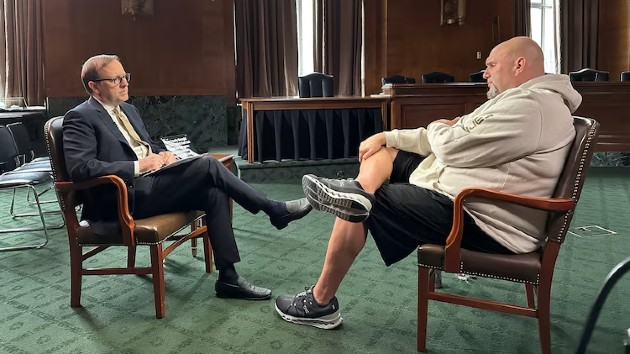Russian missile strike near Poland raises tough questions for Biden
Written by ABC Audio All Rights Reserved on March 15, 2022

(WASHINGTON) — President Joe Biden’s dual promises to consider NATO’s Article 5 a “sacred obligation” but also not to have U.S. forces engage with Russia in Ukraine may be increasingly difficult as Russian President Vladimir Putin expands the scope of his attack — with a barrage of missiles striking near Ukraine’s border with NATO ally Poland over the weekend, along with intense shelling in Kyiv overnight.
The U.S. has also warned about a possible chemical weapons attack and a senior administration official told ABC News earlier Monday that Russia is “desperately” asking for Chinese help — with China “considering” giving the Russians “airstrike capabilities.”
But amid signs that Putin is escalating, it remains unclear what consequences Russia would face from the U.S.
Russian forces targeted a military training site over the weekend in western Ukraine that had housed Western volunteers and members of the Florida National Guard training Ukrainian counterparts before the invasion. At least 35 people were killed and 134 injured, according to Ukrainian officials. There were “no Americans at all working there,” Pentagon press secretary John Kirby said Sunday.
In what some are considering a provocative message to the West, the attack — just 10 miles from Ukraine’s border with Poland — has raised the prospect of the Kremlin being increasingly likely to target Poland or other NATO allies helping to supply Ukraine. That comes on top of concerns that Russia is laying the propaganda groundwork to use chemical weapons in Ukraine and falsely accuse the Ukrainian military of doing so first.
“They are clearly expanding some of their target sets here,” Kirby said at a Pentagon briefing Monday. “I want to be careful here that we’re not reducing the kind of damage and death he’s causing to some sort of message signaling. I think that’s being way too generous to what the Kremlin is trying to do inside Ukraine.”
At Monday afternoon’s White House press briefing, a reporter presented press secretary Jen Psaki with a list of horrors witnesses in Ukraine — “maternity wards being bombed, illegal weapons being used, pediatric hospitals being targeted” — and asked where Biden draws the line on military intervention, noting former President Barack Obama drew a red line for Syria with chemical weapons.
“You have to weigh how you can lead the world, how you can make very clear that actions are horrific, that they are not acceptable, they’re not aligned with global norms — while also thinking about our own national security interests,” Psaki said. “And starting World War III is certainly not in our national security interests. Putting U.S. troops on the ground in Ukraine to fight a war with Russia is not in our set national security interests.”
Pressed again later, Psaki repeated that Biden does not intend to send U.S. troops to Ukraine and would not specify what “severe consequences” Russia would face if it uses biochemical weapons. Asked then if it’s possible the White House has no consequences left to inflict on Russia, with severe actions like a no-fly zone, transporting jets and putting U.S. troops on the ground currently off the table, Psaki called that characterization “inaccurate.”
“Those are conversations that will happen continue to happen with our national security team and with our partners and allies around the world,” Psaki said.
Meanwhile Russia has repeatedly threatened to target other countries working to resupply Ukraine, declaring them parties to the conflict — and raising fears that an attack could trickle into Poland, a NATO nation, potentially prompting NATO allies to enter the war.
After the strike near the polish border over the weekend ABC News Chief Global Affairs Correspondent Martha Raddatz asked Pentagon press secretary John Kirby on “This Week,” “If they strike in Poland, what happens?”
“We take our Article 5 commitment very seriously,” Kirby said. “An armed attack against one is considered an armed attack against all. That is why, Martha, we continue to flow and to move and to reposition forces and capabilities along NATO’s eastern flank to make sure that we can defend every inch of NATO territory if we need to.”
“Now, there’s no reason we should need to because there’s no reason that there should be war in Ukraine as it is, and we’ve made it very clear to Russia that NATO territory will be defended not just by the United States, but by our allies,” he later added.
Republican Sen. Lindsey Graham, at a roundtable at Columbia Law School on Monday, said while he is against a no-fly zone over Ukraine, he would support one if Russia used chemical weapons — which the senator called “a war crime of monumental proportion.”
“If there’s a chemical attack by the Russians in Ukraine, that would be a war crime of monumental proportion and all the treaties we’ve tried to construct around the use of chemical weapons will be considered a joke if he doesn’t pay a price. So, I would be for a no-fly zone then,” Graham said
Negotiators from Russia and Ukraine met Monday to see if they could broker a ceasefire and a potential peace deal, but the virtual meeting was stopped due to what Ukraine’s presidential adviser called a “technical pause.” The talks are scheduled to continue Tuesday.
The fourth round of talks come as a senior U.S. official told Raddatz on Monday that Russian attacks on Ukraine will increase, with the western city of Lviv, a highly-populated area, among potential targets. Russia may target the city because “they want to create more terror,” the official said.
Over the weekend, Biden approved the shipment of $200 million in additional lethal aid to Ukraine, including antitank and antiaircraft weapons, after Congress approved a new aid package, with those materials expected to arrive in Ukraine from prepositioned U.S. military stations in Europe and the U.S.
Largely unified on the issue, Congress this week will also vote to codify Biden’s executive action taken Friday, which downgraded normal trade relations with Russia — the latest example of how lawmakers have pushed the White House to take forceful steps against Russia.
And amid fears China could supply ally Russia with weapons, national security adviser Jake Sullivan met in Rome on Monday with China’s top diplomat, Yang Jiechi, in the first high-level, in-person meeting since Russia’s invasion of Ukraine.
ABC News’ Luis Martinez, Conor Finnegan, Matt Seyler, Shannon Crawford and Benjamin Siegel contributed to this report.
Copyright © 2022, ABC Audio. All rights reserved.






